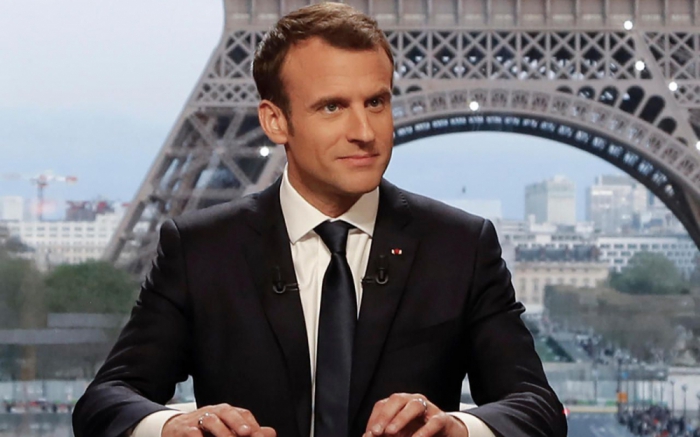Brève
Quelques secondes dans un entretien télévisé de plus de deux heures et demie ont propulsé le président de la République à la une de la presse étrangère, comme celui qui dit avoir influencé la politique du président Trump en Syrie. A quatre reprises il y répétait que « nous l’avons convaincu » de rester militairement engagé en Syrie, et de limiter les frappes aériennes aux capacités chimiques du régime. Par ces propos publics, le président français n’a pas seulement commis une gaffe. Il a aussi, et surtout, révélé d’être tenté par une approche pour le moins naïve des relations avec les Etats-Unis, laquelle avait déjà, à d’innombrables fois, conduit les Britanniques dans l’impasse.
A Washington, ses déclarations ont provoqué une réaction immédiate de la Maison-Blanche, dont la porte-parole tenait à préciser que les plans américains n’avaient pas changé, et que les troupes seront retirées dès que possible.[1] Elle a soigneusement évité d’évoquer l’affirmation, inédite, selon laquelle le président français aurait guidé les choix militaires opérationnels des Etats-Unis.[2] Pour ajouter l’insulte à l’injure, le président Macron semblait réserver ce type d’indiscrétions au président Trump. Car à peine trois minutes avant dans la même interview, il refusa de répondre à la question des journalistes concernant ses échanges téléphoniques avec le président russe, en rappelant que l’on ne dévoile pas les conversations entre dirigeants.

(Credit photo: AFP/F. Guillot)
Cette entorse aux usages diplomatiques n’avait rien de fortuit. Le président Macron se souciait avant tout de ne pas apparaître comme étant à la remorque des Etats-Unis. Si son intention est louable, force est de constater qu’il s’y est très mal pris. Au lieu de mettre l’accent, exclusivement et inlassablement, sur l’autonomie d’appréciation, de décision et d’action de la France, il a choisi de se targuer de la supposée influence qu’il aurait eue sur les décisions du président Trump. Ce discours sur l’influence est sans doute très familier aux Britanniques, puisqu'ils le cultivent depuis sept décennies. Croyant devenir ce que furent « les Grecs aux Romains », pour citer l’ancien Premier ministre Harold Macmillan, le Royaume-Uni a tout misé sur l’hypothétique influence qu’il espère pouvoir exercer sur l’Amérique. Londres a fini par abandonner des pans entiers de sa souveraineté (nucléaire, renseignement, armement etc.) en échange d’une illusion. L’illusion, maintes fois déçue, selon laquelle à force de se lier toujours plus étroitement aux Etats-Unis, les Britanniques pourraient, un jour peut-être, avoir une quelconque influence sur eux.[3]
Et ce alors même que, en tirant les leçons du fiasco en Irak, le directeur du prestigieux Chatham House, lui-même, a fait un constat sans ambages : « il a toujours été peu réaliste de croire que des puissances extérieures – aussi loyales qu’elles soient – puissent avoir de l’influence sur le processus américain de prise de décision ».[4] Pour la France, l’exemple britannique devrait servir d’épouvantail. Réfléchir en termes d’influence plutôt que d’indépendance risquerait d’éloigner irrémédiablement le président Macron de la ligne gaullo-mitterrandienne dont il se réclame. Une ligne qui n’est pas basée sur l’espoir vague d’un semblant d’influence en récompense d’un alignement sans faille. Mais sur la conviction que seule l’autonomie stratégique pleine et entière permet de nouer avec l’Amérique un partenariat sain et durable.
***
[1] White House: Trump wants U.S. forces in Syria to come home as quickly as possible, Reuters, 15 avril 2018. ; Syrie: "La mission américaine n'a pas changé", retour des forces "dès que possible", AFP, 16 avril 2018.
[2] Une version des faits contredite par les révélations de la presse sur les coulisses internes de la décision, au sein de l’administration : Trump Bowed to Pentagon Restraint on Syria Strikes, Wall Street Journal, 16 avril 2018.
[3] Pour quelques exemples concrets, voir de l’auteur: Petites perles de la relation (très) spéciale UK-USA, Theatrum Belli, 4 octobre 2014. Pour une analyse plus détaillée des effets néfastes, côté britannique, de la « relation spéciale », voir de l’auteur : The Transatlantic Dimension of British Euroscepticism, in The UK Challenge to Europeanization (ed. K. Tournier-Sol - C. Gifford), Palgrave Macmillan, 2015; de même que The United Kingdom and the paradigm shift in transatlantic security, Written evidence to the UK Parliament Defence Committee, March 2017.
[4] Victor Bulmer-Thomas, Blair’s Foreign Policy and its Possible Successor(s), Chatham House Briefing Paper, December 2006.
Tags:
france, royaume-uni, syrie, relations transatlantiques




















